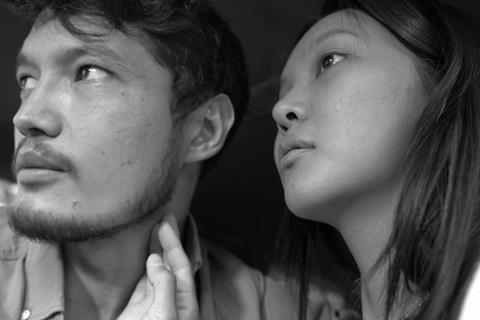Kim Ki-Duk’s posthumous final film fails to leave a lasting impression

Dir: Kim Ki-duk. Estonia/Lithuania/Kyrgyzstan. 2022. 81mins
The late South Korean auteur Kim Ki-duk had seen his reputation tarnished some time before he died, aged 59, of Covid-related complications in December 2020. He had been subject to allegations of sexual assault, while the more extreme end of his oeuvre, notably films such as 2000’s notorious The Isle, have fallen out of favour due to their element of misogynistic violence. There’s a characteristic streak of sexual perversity in his final film, the posthumous Call Of God, although it’s oddly naïve, even gentle, in its depiction of amour fou. Its gaucheness is, however, unlikely to rehabilitate Kim as a significant auteur.
Call Of God is subtitled ‘A Tribute to Kim Ki-duk’, but it’s not a tribute that does him many favours
Shot in Kyrgyzstan with Russian dialogue, Call Of God – as completed posthumously by Kim’s Estonian collaborators – is subtitled ‘A Tribute to Kim Ki-Duk’, but it’s not a tribute that does him many favours. The film begins with an on-screen quotation from Kim, in which he wishes he could return to his twenties. The completed Call Of God effectively does take him back there, insofar as it resembles a callow student project; albeit a gorgeously photographed one, with Kim himself shooting in poetic black and white (and a final touch of colour) echoing the romances of the early nouvelle vague.
The heroine is a young, unnamed woman (Zhanel Sergazin) who begins her day by making faces at herself in the bathroom mirror before donning a white mini-dress and heading out. About to cross the road, she’s approached by a dashing young man (just ‘Man’ in the credits, although everyone addresses him as Daniel), played by Abylai Maratov. He asks her if she can direct him to a local café, leading us to suspect that he’s a smoothie pick-up artist (which he sort of is). In fact, he’s heading to the café to confront his ex-girlfriend (Aygerim Akkanat), who has moved in with a new, older lover – and for some reason, Daniel has a pathological objection to her dating older men.
Daniel, it turns out, is a writer who has published a novel called ’Love Is A Dream’ – although from what the heroine reads, it seems to double as a very old-fashioned romantic self-help manual. The pair soon hook up; she’s demurely but flirtatiously resistant at first, but abandons all restraint when they see another couple making love in the car opposite theirs, a curious case of dogging by contagion. They move in together, but eventually their torrid passion wanes, causing deep ructions between them – which is odd, considering that it’s only about a week since they met.
Their differences are compounded by the fact that another ex of Daniel’s has heard their noisy lovemaking on speakerphone, and promptly killed herself. All in all, jealousy is a terrible force in Call Of God, and spawns some terrible dialogue, at least in the English subtitles: “I didn’t want your hot tongue to get into another woman’s mouth… It pissed me off that your sweat could drip into someone’s eyes.” Roll over Betty Blue…
Meanwhile, the woman has all along been receiving phone calls from a mysterious male figure who appears to be God, no less; in fact, the Russian word ‘Bog’, meaning God, appears on her phone screen at one point, although later it’s replaced by a number (in case anyone wants to freeze-frame and try calling it). The calls keep interrupting her dream – because a dream is what it has all been– with the voice telling her that her liaison with Daniel could become real if she wants it to.
Despite the simply but poetically shot city- and country-scapes that frame their romance, it’s hard to care about such a one-dimensional duo, even if Kim is casting an ironic light on their romance, which isn’t immediately obvious. As Daniel, Maratov cuts a rakish swagger, but Sergazin’s impassioned ingenue turned sexual firebrand never quite comes alive. The editing, whatever Kim intended, is oddly messy at times: at one point, there’s a completely unmotivated cut to a man making coffee, while shots of the heroine looking rapturous about nature verge on the twee. It all looks handsome, though, and Kim clearly knew what he was doing with the more absurd touches – like what appears to be a carved wooden banana that is used as a weapon at one point.
Production companies: Kim Ki-Duk Films, Estofilm
International sales: MTU Otaku alain.estofilm@gmail.com
Producers: Tatjana Mühlbayer, Nargiza Mamatkulova, Darius Vaiteikunas
Cinematography: Kim Ki-Duk
Production design: Orozbai Absattarov
Editing: Audrius Juzėnas, Karolis Labutis
Music: Sven Grünberg
Main cast: Zhanel Sergazin, Abylai Maratov, Aygerim Akkanat























